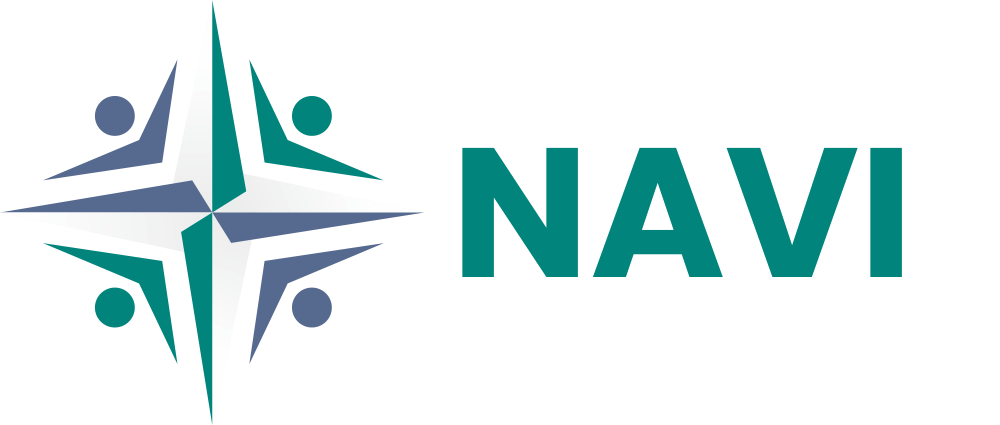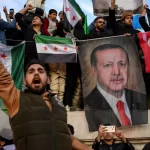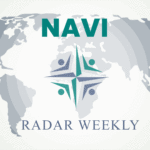Subscribe to NAVI Radar Weekly here
Focus Point: Regional Security- Transatlantic Security/NATO
Russia revises nuclear strike threshold against NATO members, Ukraine | Politico
By Ketrin Jochecova | 19.11.2024
Russian President Vladimir Putin on Tuesday signed a revised national nuclear doctrine that expands the conditions under which Moscow may use its nuclear weapons, making it easier to justify retaliation against a NATO member for helping Ukraine.
The updated doctrine now states that Russia will consider as a joint attack any attack from a nonnuclear country backed by a nuclear power. It also noted that the country could retaliate with nuclear force to a conventional weapons attack that threatens its sovereignty.
Russia will consider as a joint attack any attack from a nonnuclear country backed by a nuclear power.
“Russia’s new nuclear doctrine means NATO missiles fired against our country could be deemed an attack by the bloc on Russia. Russia could retaliate with WMD [weapons of mass destruction] against Kiev and key NATO facilities, wherever they’re located. That means World War III,” Dmitry Medvedev, a former Russian president and the deputy chair of Russia’s security council, wrote in a post on X. Read more…
Focus Point: Security and Defense Policy- Russia-Ukraine War
Ukraine has used US-supplied missiles on Russian territory for first time, Moscow says | Euronews
By Sasha Vakulina | 19.11.2024
The Russian Defence Ministry is claiming that Ukraine has launched US-supplied ATACMS missiles at Russian territory for the first time on Tuesday. In a statement on Telegram, the ministry said Ukraine “struck a facility in the Bryansk region with six ballistic missiles.”
“According to confirmed data, American-made ATACMS operational-tactical missiles were used,” the statement said.
Moscow went on to say its air defences had shot down five of the missiles and damaged one more.
“The fragments fell on the technical territory of a military facility in the Bryansk region, causing fire that was quickly extinguished. There was no damage or causalities.” Euronews could not independently confirm these claims. Read more…
Focus Point: Security and Defense Policy- Russia-Ukraine War
U.S. Embassy and other missions shut down in Kyiv over attack fears | The Washington Post
By David L. Stern I 20.11.2024
The announcement came a day after Ukraine used U.S.-supplied missiles to strike inside Russia, raising fears of retaliation against the capital.
American officials warned Wednesday of a “potential significant air attack” on Kyiv and said the U.S. Embassy in the capital would be closed “out of an abundance of caution” after Ukrainian forces struck an arms depot inside Russia with U.S.-supplied weapons systems.
“Embassy employees are being instructed to shelter in place,” a statement on the embassy website said. “The U.S. Embassy recommends U.S. citizens be prepared to immediately shelter in the event an air alert is announced.”
The Italian, Greek and Spanish embassies in Kyiv would also be closed temporarily, statements on their websites and media reports said. The Italian Embassy warned of a “possible high-intensity airstrike,” citing the U.S. Embassy statement. Read more…
Focus Point: Regional Security- Transatlantic Security/NATO
How do European nations view their contribution to European and global security, and their role within NATO? | NDC
By NDC | 20.11.2024
Looking beyond the eastern flank, European nations are fostering a 360-degree approach to security and defence. They emphasized the importance of NATO’s southern neighbourhood, especially for Italy and Spain, viewing the Mediterranean, the Middle East and Africa as strategic regions with a direct impact on Euro-Atlantic security and stability.
The Indo-Pacific was also highlighted as an increasingly important area of focus for the Allies, with particular attention paid to China as NATO’s and Europe’s main strategic competitor. London discussed its “cooperate, compete and challenge” approach to its relationship with Beijing, aimed at containing China’s growing influence while maintaining secure ties in certain areas such as trade, climate change and global health.
The lectures underscored European nations’ commitment to multilateralism and collective security. The host countries highlighted their contributions to multilateral organizations, especially the EU and NATO.
While addressing the need for the EU to play a more central role in its own defence, the briefings reaffirmed NATO’s role as a cornerstone of Europe’s security. In particular, the discussions emphasized the importance of enhanced cooperation and interoperability between the EU and NATO.
Focus Point: Security and Defense Policy- Great Power Competition
US admiral says sending Israel and Ukraine weapons like Patriot missiles is eating into what’s needed for countering China | Business Insider
By Matthew Loh | 20.11. 2024 | Subscription needed
- Adm. Sam Paparo is concerned that the US is giving out vital defenses it needs to deal with China.
- “It’s now eating into stocks,” he said on Tuesday of advanced weapon shipments to Ukraine and Israel.
- Paparo urged the Pentagon to start replenishing those stocks and expand beyond its original inventory.
The US Navy’s top commander in the Indo-Pacific raised concerns on Tuesday that the Pentagon’s advanced weapons shipments to Ukraine and Israel could sap the strength it needs to deal with China.
While speaking at the Brookings Institution, Adm. Samuel Paparo said he initially hadn’t been concerned with the weapons sent to the Middle East and Europe.
“Up to this year, where most of the employment of weapons were really artillery pieces and short-range weapons, I had said: ‘Not at all,'” said Paparo, who’s been commander of US Indo-Pacific Command since May.
“But now, with some of the Patriots that have been employed, some of the air-to-air missiles that have been employed, it’s now eating into stocks,” he added. “And to say otherwise would be dishonest.” Read more…
Focus Point: Security and Defense Policy- Emerging Threats and Global Risks
Suspected sabotage by a Chinese vessel in the Baltic Sea speaks to a wider threat | Atlantic Council
By Elisabeth Braw | 21.11.2024
Officially the Yi Peng 3 is just a bulk carrier, one of countless such ships carrying everything from grain to coal, aluminum, and fertilizer. But as she left Russia’s Baltic port of Ust-Luga last week, the Chinese-flagged ship may have had a rather different mission. Authorities and the open-source intelligence (OSINT) community have zeroed in on the Yi Peng 3 as potentially responsible for cutting two undersea cables on her journey through the Baltic Sea, and Germany’s defense minister has already called this a hybrid attack. More such incidents should be expected.
On November 17, an undersea cable connecting Sweden and Lithuania was cut, and less than twenty-four hours later, the only communications cable connecting Finland with Germany was also severed. As OSINT investigators quickly gathered, the Yi Peng 3 was at the scene both times. Swedish, Lithuanian, Finnish, and German authorities have not yet publicly blamed the bulk carrier, but as she sailed from the Baltic Sea toward Denmark’s Great Belt and from there toward the Atlantic Ocean, her actions have drawn scrutiny. By the time the bulk carrier reached the Great Belt, on November 19, she was being followed by Danish Navy vessels.
But being open about the threats, not to mention the attacks, is a first step.
Pistorius deserves credit for saying that “nobody believes that these cables were accidentally severed” and for calling it “sabotage,” which has brought a larger public spotlight on this evolving drama. Sweden’s minister of civil defense, Carl-Oskar Bohlin, has gone further, regularly telling Swedes in no uncertain terms about the hybrid threats the country faces and exhorting citizens to do their part to thwart the power of hybrid attacks. That matters, because the attacks will continue—and not just under the sea. Read more…
Focus Point: Security and Defense Policy- Russia-Ukraine War
With Use of New Missile, Russia Sends a Threatening Message to the West | NYT
By Marc Santora, Lara Jakes, Valerie Hopkins, Andrew E. Kramer and Eric Schmitt | 21.11.2024
The intermediate-range missile did not carry nuclear weapons, but it is part of a strategic arsenal that is capable of delivering them.
President Vladimir V. Putin escalated a tense showdown with the West on Thursday, saying that Russia had launched a new intermediate-range ballistic missile at Ukraine in response to Ukraine’s recent use of American and British weapons to strike deeper into Russia.
In what appeared to be an ominous threat against Ukraine’s western allies, Mr. Putin also asserted that Russia had the right to strike the military facilities of countries “that allow their weapons to be used against our facilities.”
His warning came hours after Russia’s military fired a nuclear-capable ballistic missile at Ukraine that Western officials and analysts said was meant to instill fear in Kyiv and the West.
Though the missile carried only conventional warheads, using it signaled that Russia could strike with nuclear weapons if it chooses.
On top of everything else, Russian and Western officials have sparred over who is to blame for the recent spate of escalation. While the Kremlin blames Washington for granting Ukraine permission to strike Russian targets with Western weapons, the White House has said Russia’s own actions brought about the decision, specifically citing Russian’s decision to invite thousands of North Korean troops to help dislodge a Ukrainian occupation of part of Russia’s Kursk region. Read more…
Focus Point: Regional Security- Middle East
ICC issues arrest warrants for Netanyahu, Gallant, and Hamas leader Deif | Euronews
By Evelyn Ann-Marie Dom | 21.11.2024
The International Criminal Court (ICC) has issued arrest warrants for Israeli Prime Minister Benjamin Netanyahu, former Defence Minister Yoav Gallant, and Hamas military commander Mohammed Diab Ibrahim Al-Masri, aka Mohammed Deif.
In a written statement on Thursday, the ICC said Netanyahu and Gallant are responsible for committing “the war crime of starvation as a method of warfare; and the crimes against humanity of murder, persecution, and other inhumane acts.”
The Israeli Foreign Ministry said in September that it had submitted two legal briefs challenging the ICC’s jurisdiction and arguing that the court did not provide Israel the opportunity to investigate the allegations itself before requesting the warrants.
The ICC said that “the acceptance by Israel of the Court’s jurisdiction is not required.” Read more…
Focus Point: Regional Security- Transatlantic Security/NATO
How Europe can save NATO? | Atlantic Council
By Hans Binnendijk and Timo S. Koster | 22.11.2024
President-elect Donald Trump will likely return to office skeptical about NATO’s value and Europe’s contribution to its own security. Officials who worked directly with Trump in his first term are convinced that he has no qualms about reducing or even ending the United States’ commitment to the Alliance. But Trump will again be a transactional president who wants to demonstrate strength. With the proper initiatives, European allies can save the Alliance. These allies should start by focusing the June 2025 NATO Summit in The Hague on Europe’s strategic responsibilities, agreeing on ways that Europe can remove some of the United States’ defense burden.
Major European powers are faced with flagging economic growth, weakened leadership, and Ukraine war-weariness. Therefore, much of the leadership burden will fall on new NATO Secretary General Mark Rutte. He is up to the task. As a former center-right Dutch prime minister, Rutte is known to have a cordial relationship with Trump, and like Trump, he is a dealmaker.
At the global level, the June summit should establish a new division of responsibility among NATO, the EU, and the United States. This could further lighten the US burden. NATO’s prime responsibility would be defense of its treaty area. The EU might take prime responsibility for conflicts to its south, primarily in Africa. Security in the Middle East might be a joint national responsibility with a US lead, as it has been in the Red Sea.
This agenda for The Hague summit is a tall order. This will be especially true if the United Sates and Europe are in a trade war triggered by the new tariffs promised by Trump. But the security stakes are exceedingly high. It’s time for Europe to step up, play the enhanced security role that it should play, and save NATO in the process. Read more…
Thank you very much for reading.
The NAVI Research Institute is the research division of NATO Veterans Initiative - NAVI that provides a unique perspective to transatlantic leaders and societies on peace and security through the lens of NATO's founding principles of rule of law, democracy, human rights, and individual liberties. The NAVI Research Institute was officially established by the NAVI Board on July 16th, 2023.

![NAVI-PROJE-[Recovered] Radar Weekly](https://nato-veterans.org/wp-content/uploads/2024/05/NAVI-PROJE-Recovered-696x392.gif)

